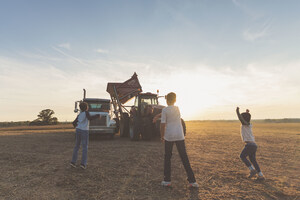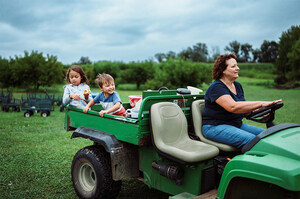
Land O'Lakes CEO Reports Strong 2009 Performance, Outlines Value of Cooperatives
MINNEAPOLIS, Feb. 24 /PRNewswire/ -- Land O'Lakes achieved strong, and in some cases record-level, financial results in 2009, despite a weak economy. That was the message from the national food and agricultural cooperative's President and Chief Executive Officer Chris Policinski, who addressed approximately 1,000 delegates and visitors today at the Land O'Lakes 89th Annual Meeting in Minneapolis.
After reviewing the company's 2009 performance, Policinski outlined the important role farmer-owned cooperatives play in building agricultural productivity and feeding a growing global population.
2009 Highlights
"In 2009, Land O'Lakes delivered solid financial results, maintained a strong balance sheet, and made progress against strategic goals despite a weak global economy and volatile and depressed commodity markets," Policinski said.
Among the 2009 results he highlighted were:
- A record-high $209 million in net earnings;
- A record-high $108 million in cash returned to members;
- Improved balance sheet strength with reduced total debt and completion of an advantageous debt-refinancing package; and
- Continued brand strength and innovation leadership.
(Note: For details on Land O'Lakes financial results, go to www.landolakesinc.com.)
Policinski noted that, along with strong earnings, Land O'Lakes' record-high cash returned to members is particularly important. "As a member-owned organization, generating strong member returns is a commitment we take very seriously," he said. "That is particularly true in these difficult times across agriculture." Land O'Lakes has returned more than $400 million in cash to members over the past five years.
The Value of Cooperatives
The cooperative CEO went on to discuss the value of cooperatives, detailing their contributions to agricultural productivity and producer success, as well as addressing questions being raised regarding the relevance and value of the cooperative business structure.
Cooperative Value
Providing statistical data, Policinski praised U.S. agriculture's remarkable increase in productivity and the contributions of farmer-owned cooperatives to this success story.
"Over the past 60 years, U.S. agricultural productivity has increased 250 percent," Policinski said. "And, whether it's in the area of capital and infrastructure, research and development, or the transfer of new technology and insight, cooperatives have played a major role in that advance … delivering value by helping to build agricultural quality, productivity and profitability. "
Putting context around the productivity story, Policinski noted that:
- In 1930, the average U.S. farmer fed 10 people, and today that figure is 155;
- Since 1930, average corn yields are up more than seven-fold, wheat yields have tripled, and per-cow milk production is up four-fold.
"America's farmers are producing more with less," he said. "Given limited land and water resources, this has positive implications both economically and environmentally."
Policinski noted that if U.S. consumers were paying the same percent of disposal income today as they did in 1930, they would have about $1.6 trillion less disposable income for other spending, savings or investment.
The value delivered by cooperatives ripples across the economy in other ways, he added, noting that cooperatives deliver some of the nation's most trusted brands, contribute to local economic activity, strengthen the tax base, and create employment opportunities across middle America.
Among the supporting statistics were the results of a 2008 U.S. Department of Agriculture study that showed cooperatives generate an estimated 200,000 jobs and $165 billion in economic activity.
Policinski added that cooperatives deliver unique value to members by expanding their presence across the food and agricultural value chain.
"Without cooperatives, producers would participate in only about 5 percent of that value chain," he said. "Clearly, cooperatives improve producers' ability to build economic success and capture value from the marketplace."
Cooperative Size
Policinski also addressed comments from some critics that cooperatives today have become too large. "Cooperatives today must be positioned to deal with large, well-financed, well-managed global competitors and customers," he said. "If you look at the facts, the top 10 non-cooperative global agricultural and food companies are about seven times as large as the top 10 U.S. ag and food cooperatives, while the top 10 food retailers are 16 times as large." Those numbers, Policinski said, provide evidence that cooperatives have not gotten too large, but instead need to continue to increase their size and scale:
- To meet the challenge of large and growing competitors;
- Serve the needs of large and growing customers; and
- Negotiate effectively with large and growing vendors, suppliers and business partners.
The cooperative CEO also noted that as farm operations continue to increase in size and complexity, cooperatives must grow along with them in order to meet increasing producer-member needs.
Cooperative Business Performance
Policinski also addressed the issue of cooperative performance, noting that some skeptics of the cooperative business structure claim cooperatives are more prone to underperformance than investor-owned firms.
In response, he quoted a 2007 University of California study that found the "Performance of cooperatives was on par with that of similar investor-owned firms," and he cited statistics that showed (in terms of return-on-equity or return-on-assets) cooperative performance generally tracks with that of the S&P 500 as a whole.
The Future for Co-ops and Members
Policinski closed his remarks by asserting that it is essential that cooperatives and producers continue to advance agriculture productivity.
He noted that analysts project that between now and 2050 a 70-percent increase in food production will be needed to meet global food needs. And – given limited land and water resources – the bulk of that increase will have to come from new technologies and improved production management practices.
"No one has proven more adept at improving agricultural productivity than the American farmer – and those gains have often been driven in partnership with farmer-owned cooperatives," he said. "We must continue that partnership. We must continue to grow together."
Land O'Lakes, Inc. (www.landolakesinc.com) is a national, farmer-owned food and agricultural cooperative with annual sales of $10 billion. Land O'Lakes does business in all 50 states and more than 60 countries. It is a leading marketer of a full line of dairy-based consumer, foodservice and food ingredient products across the United States; serves its international customers with a variety of food and animal feed ingredients; and provides farmers and ranchers with an extensive line of agricultural supplies (feed, seed, and crop protection products) and services. Land O'Lakes also provides agricultural assistance and technical training in more than 25 developing nations.
SOURCE Land O'Lakes, Inc.







Share this article